- Home
- Penelope Lively
The Photograph Page 2
The Photograph Read online
Page 2
When did I write that? he wonders. Not bad, eh? He seems to remember saying it to camera, when they did the first television series. That heady time. Those were the days. Being whisked around with that attendant entourage—the pretty, feisty girls with clipboards, and the director and the camera people and the sound people—and himself always at the hub of it all. Holding forth on hillsides and halfway up cathedrals and realizing that he loved every minute of it. Being recognized by strangers once the programs had gone out: that sideways glance in the street or on a railway platform. Snide remarks from colleagues, for which he didn’t give a damn. Jealous, weren’t they? Oh, it was a helterskelter, full-pelt time, that was.
But work, all of it. Well, there’s work and work. And I’ve been wet and cold too, thinks Glyn, and I’ve done a spot of digging, though I pass on shoveling and hauling, and hungry hasn’t much come into it. But there’s not a day of my life in which I haven’t worked.
And here Kath comes in, dead on cue.
It is her voice that is clearest. What is said. Why is it that words hang in the mind forever? A sentence that is spoken over and over again. In his head, Kath is words quite as much as she is flesh and blood.
“You’re not going to come with me?” The tone shoots up—a high emphatic note: “. . . with me?” And now he sees as well as hears. She is sitting at the other end of the table in the kitchen in Ealing, a letter in her hand. It must be summertime; her skin is very brown against her white shirt. That gold chain is round her neck. Her hair is damp from the shower, flattened against her neck.
“You’re not coming with me to Devon for a lovely weekend with the Barrons?” Now she gives him that teasing look—never pleading, oh, never that, just a take-it-or-leave-it quirky glance. “Plenty of landscape in Devon.”
And he explains—no doubt for the second or third time—that there is this conference.
“Never mind,” she says. “Too bad. Toast?”
Kath did not work. Kath was not fettered by obligation, by responsibility, by having to be in a certain place at a particular time, by having to do things she might not especially wish to do. In the mind’s eye, Kath is forever breezing down the street, smiling, traveling light, while all around her is perforce and necessity: the postman dealing out mail, door-to-door, the van driver heaving cartons into the corner shop, the patrolling traffic warden, the gang busy with hydraulic drills and JCB, the estate agents displayed at their desks, the driver of the taxi panting at the lights. All except Kath, who is bound for some destination of her choice, to do something she prefers to do.
And even when Kath did work she did not appear to be doing so. When she had a job—in those interludes when she was employed, gainfully or otherwise—it was because she had elected to do so. It had seemed suddenly interesting or entertaining to help out in an art gallery or a craft center, to get involved in a music festival, to do picture research for a publisher. And when the interest and entertainment faded, somehow Kath was no longer there. She had simply melted away, from one day to the next—perhaps with a vague apologetic smile, perhaps not.
Glyn knew these episodes, because he was sometimes on the receiving end of the inquiring phone calls, which could range from perplexity to indignation.
How did she do it? Well, thinks Glyn, she managed nicely for ten years because she was married to me. I paid the bills. I fed her and housed her and clothed her, pretty well. But before that? After all, Kath was a fully fledged adult by the time she came into my hands. She was thirty-six, she had been on the loose for twenty years, given that the home more or less broke up when the mother died. The girls each had a bit from her, of course, but not enough to live on. Well, not quite, but enough to scrape by, perhaps, in a hand-to-mouth sort of way. With the occasional top-up from somewhere or someone. I suppose that is the answer. And Elaine, being Elaine, set to and learned a trade and worked for the next forty years—very lucratively, these days, one understands—while Kath, being Kath, did not.
Glyn is still ferreting away in the cupboard, but if the offprint comes his way he is in danger of missing it entirely, so dense are his thoughts. He is finding that these thoughts are nothing new, but that everything is somehow skewed by what has just happened. This illness that he now has—this fever—has given everything a twist. Kath is both what she ever was, and she is also someone else. He is looking differently at her—he is looking differently for her.
She toiled not, neither did she spin. She did her own thing. In that sense she was in tune with the spirit of the day. But in other ways she was not. She didn’t care a jot for achievement or status—neither for herself nor in others. She laughed at pretension. The hedonistic climate of the times suited her well, but the confrontations of the day were of no interest. I don’t remember Kath ever getting exercised about the international situation or how she should vote. Feminism passed her by. Women’s rights meant nothing to her because she had them anyway. Nothing had ever been denied to her because she was a woman. Being a woman enabled her to sail through life, setting her own course, following mood and fancy.
But not every woman can do that, thinks Glyn. Oh dear me, no. And why could Kath do it?
Because.
And at this point consideration gives way to imagery. He no longer thinks about Kath but sees her, experiences her. He sees her breasts. Small, neat breasts—little cones tipped with those surprising chocolate-brown nipples. He could not take his eyes off them, once, and they surge again, full frontal, at this moment. That bush—a rich, silky pelt exactly matching her hair. Those legs. Her slim feet. And her face. Oh yes—her face.
Kath could do it because she was a startlingly attractive woman. Not a conventional beauty, but with looks that were maverick and mesmerizing. The small face with those delicate features—the set of her nose, green eyes that seemed to catch the light, mouth tilted when she smiled. If she was present, you noted that everyone’s glance strayed towards her. Men, women. Even children. Kath had an affinity with children. They drifted her way, and she to them. Perhaps if . . .
God, no. Kath as a mother? She with the attention span of a butterfly. Just as well it was never on the cards. And, anyway, I never wanted children.
He has reached the top shelf of the cupboard now. More files; more boxes of this and that. Oxfordshire Drove Roads—1984. He opens the box: maps, photographs, and Kath once more. Not as such, not standing somewhere sometime holding someone’s hand, twisting the past, but lightly laid across that time, staking a claim.
“Why are we here?” she says. “It’s getting terribly muddy.”
She has climbed onto a five-barred gate and sits there, squinting into the sun. She is wearing jeans and a T-shirt with no bra. Glyn can see the shape of her nipples through the thin material; this sight distracts him from the matter in hand, which is close inspection of the Ordnance Survey map. If there were a nearby haystack he would take her into it and be done with it. But when did you last see a haystack? He does not yet know this woman very well, but soon will, if things go according to plan.
They have been following a track between fields, the grassy surface of which has now given way to rutted mud and puddles. Glyn is interested in the width of the track. He considers this, resolutely ignoring Kath’s nipples. One thing at a time. “We’re here,” he says, “because I think this track may be an early drove road. I need to check it out. I did mention this when we set off.”
“So you did. I keep forgetting you’re working.” She laughs. That laugh. Like no other. “It feels like a country walk. But, actually, would you mind if I stay put here while you check out the rest of it? I’m going to sunbathe behind the hedge.”
And she is over the gate, into the field, and is sprawled with her back on the grass, T-shirt off, bare-breasted to the sky.
He shoves the box back onto the shelf, and as he does so he spots a cache of papers behind. Offprints—aha! And, yes, here at last is the quarry: “Basic Patterns of Settlement Distribution in Northern England,” Advancement
of Science, 1961.
Had he started at the top, that file would never have come to light. Or not on this particular day. The day would have proceeded as it should; he would now be at his desk downstairs, getting on with the work in hand.
Glyn sweeps up all that he needs, closes the cupboard, and goes down to his study. There he sets the offprint to one side. He will get back to work in due course, dammit.
He takes out the photograph.
Look again. I may have missed something first time round. Kath is wearing a full skirt, and some sort of black top that shows a lot of her neck and back. I think I remember that top. She has dangly earrings. Those too I remember.
Nick wears dark trousers and a short-sleeved check shirt. Neither item strikes a chord, but I remember well that characteristic somewhat too long hair and the way it flopped across his forehead. Here, it obscures his face, which is turned to one side, looking not at Kath but towards someone else. Towards Elaine, it seems.
Elaine faces the camera. She is speaking, perhaps—her mouth is slightly open. Maybe she is speaking to them. She wears trousers and a casual sort of sweater thing, a bag slung over one shoulder, a denim hat.
The other two I do not recognize. A tall thin man. A shortish woman with dark curly hair. Also dressed in light, casual clothes, which tells me only that this is summer, and that the occasion is distinctly informal.
Quite a little party. And then there is the photographer, of course. Him; her.
Where am I? Well, patently I am not there. I was absent, elsewhere, about other business.
And where are they all? The background is anonymous. A belt of trees. Grass on which they stand. Sky—blue, the odd white cloud.
An outing. A little excursion. “Listen, let’s go to . . . Drop everything, why don’t you! It’s a heavenly day. Elaine’s coming, and Nick of course. . . .”
When? Judging by Elaine’s youngish face we are looking back into the 1980s. Thereabouts.
But one would like to know precisely when. No—one would not like to know, but one feels driven to know. I am driven to extract from this vital piece of evidence all that it can tell about how things were back then, since it appears that they were not as they seemed to be at the time, nor as I have believed them to have been ever since.
When was this photograph taken?
And who was the photographer? The person who collected a wallet of developed film, idly inspected the contents, looked more closely at this print, did some quick thinking, cut the negative from the strip, passed on the print to him.
Tacit collusion. By whom?
The person who can tell me, of course, is Elaine. Who may or may not have been in collusion herself—and that I need to know—but who will certainly be aware of the identity of all members of the party on that interesting little outing.
And now it is Elaine who fills the room. He sees and hears her, in various incarnations. He has known Elaine for a long time, in different ways. Crucially, she is Kath’s sister, and it is as such that he now examines her.
Well, they weren’t all that close, of course. Elaine the elder by far, and the two of them poles apart—in looks, inclinations, personality, everything. But there was something going on between them—that odd mix of tension and commitment between siblings. Elaine sniping away about Kath being Kath, which she never apparently came to terms with—but then coming over all protective. Kath suddenly nipping off to see Elaine for no good reason, ringing her up late at night.
None of my business, anyway, thinks Glyn. It was up to them. But now suddenly it is his business. Where does Elaine stand over this matter? Does she know? Did she know?
He scrutinizes Elaine—Elaine of that time, successful garden designer, burgeoning businesswoman, Nick’s wife. Longtime associate of his own—he and Elaine go way back, after all. But Elaine is tiresomely inscrutable. She speaks and looks and does as she always has: no clues. Perhaps she was ever thus—quite a cool customer, Elaine.
She was in this room, once. Back then. When. After. “Will you go on living here?” she asks.
And when he replies she makes no comment. She offers to see to Kath’s things. Which she did, though not, evidently, achieving a clean sweep.
As if he needed a house move, on top of it all. Yes, of course there would be . . . resonances. But there will be resonances anyway. One would have to learn to live with them.
He dismisses Elaine. She has nothing to offer, or at least not in this form. He pulls his notes towards him, switches on the computer: it is midafternoon and enough of the day has been dissipated.
That photograph smolders in its envelope, and in his head.
A dispassionate view of Glyn himself, at this moment, would show a man of around sixty staring at a computer screen, a shock of dark hair, flicked with gray. A square, rugged face that has evidently seen a good deal of fresh air—the reddened, weathered look of a farmer. Large brown eyes, chunky brows. Mouth pulled down at the corners, indicating perhaps embattled concentration. He thumps the keyboard, making a lot of errors: a two-fingered typist. Once in a while he reaches for a paper from the pile beside him, scowls sideways at it, bangs away again.
The room is a workshop, that is clear enough. It is lined with bookcases, crammed from top to bottom: books vertical, books horizontal. Tables and chairs piled with papers. Filing cabinets. There is little that is decorative or nonfunctional: a pair of Staffordshire dogs on the mantelpiece, a luster jug on the windowsill, a worn Persian rug on the floor. A framed Ordnance Survey map of a patch of Yorkshire from the mid-nineteenth century. Some aerial photographs of green sections of landscape. A color photograph of Glyn himself, a couple of decades younger, handsome on a windblown hillside, with scrawled signatures beneath his feet: “Greetings from us all: Changes in the Land team, 1980.”
Pull back further—take a more distanced view—and the room is subsumed within a house that stands in a tree-lined street of detached homes with small gardens: a 1930s development, the prewar extension of the southern English city that can now be seen—pull back further yet, up into the ultimate dispassionate eye, the sky itself. And there is the city, there is the accretion of stone, brick, wood, glass, and metal. There is the cathedral, riding high amid the central jumble. There are the ravines of roads, the encircling discipline of chimneyed terraces, a belt of parkland, the white cliffs of office blocks, and on the outskirts the neat geometry of the university at which Glyn is employed.
No people here; the insect-crawl of cars. Glyn’s house is lost now, digested into the urban mass, a tiny box in a row of similar boxes. And the mass itself, the inscrutable complex muddle, bleeds away at its edges, getting sparser and sparser until it is lapped entirely by space. Or rather, by spaces—squares and triangles and rectangles and oblongs and distorted versions of such shapes, edged sometimes with dark ridges. Dark spongy masses, long pale lines slicing away into the distance. Here and there a miniature version of the city density, a little concentration of energy at the confluence of lines. And then eventually space gives way—there is spillage, seepage, a burgeoning unrest that condenses once more into city format: the enigmatic fusion of now and then, everything happening at once.
If you know what you are looking at, that is. If you are Glyn Peters, who has got up now from his computer and is pulling out the wide shallow drawers of a cabinet. He finds what he wants—a map and a large aerial photograph. He spreads the two on top, side by side, pores over the aerial spread, seeing not space and shape but an assemblage of time. He sees centuries juxtaposed, superimposed, carving each other up, pushing one another out of the way. He sees the labor of medieval peasants etched beneath the rigorous lines of eighteenth-century enclosure; he sees a motorway slammed across a Roman road; he sees the green mound of a Norman castle thrusting up from the clutter of a city center.
He sees himself, staking out private territorial claims. Been there, done that. There is Bishops Munby, where he spent the summer of 1976, supervising the excavation of a lost medieval village
. He can see that field still, with its eloquent lumps and bumps and declivities, its record of the little buildings that had been here, the village street, the string of fishponds. Days of sun, days of rain, the wandering inquisitive cattle, the makeshift canteen in a tent. The evenings in the local pub, the jolly student-labor force. He sees the girl from Durham, Hannah someone, young lecturer, with whom there had been a mutually satisfactory arrangement over that time: frayed denim shorts and long brown legs, glinting a conspiratorial smile as she trowels away at a wall.
He is down there ten years later, amidst that industrial conurbation, matching street patterns against the early survey maps. Solitary work, the place eddying around him, people casting a glance at the man with his clipboard and knapsack who prowls to and fro. A time of furious application, with his big book in the pipeline, his head buzzing with projects. And Kath’s voice comes in here, rising off the glossy surface at which he is staring, which is overlaid now by that rank-smelling hotel in which he used to stay, Kath’s voice on the phone: “I’m off to France for a couple of weeks with some people, since you don’t seem to be around this summer.” A pause. “Do you love me?” she says. He is writing up his notes in his hotel room: and there is Kath, a hundred and fifty miles away. She is reverberating still. But he hears only her; he himself is extinguished. What did he say to her? Goodness knows.

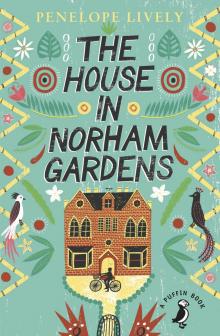 The House in Norham Gardens
The House in Norham Gardens Family Album
Family Album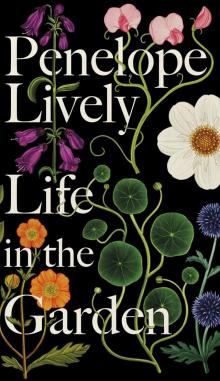 Life in the Garden
Life in the Garden Oleander, Jacaranda: A Childhood Perceived
Oleander, Jacaranda: A Childhood Perceived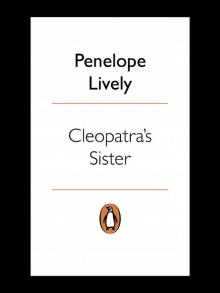 Cleopatra's Sister
Cleopatra's Sister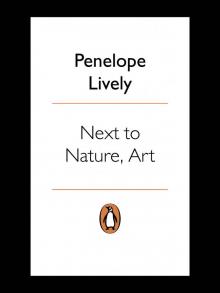 Next to Nature, Art
Next to Nature, Art A Stitch in Time
A Stitch in Time Moon Tiger
Moon Tiger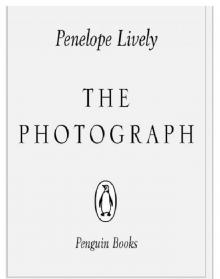 The Photograph
The Photograph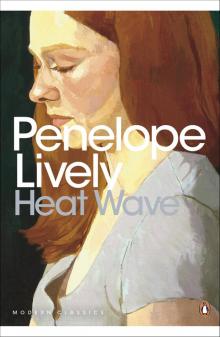 Heat Wave
Heat Wave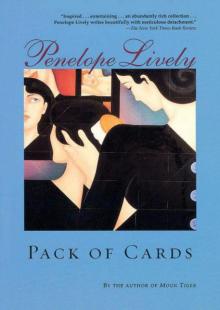 Pack of Cards
Pack of Cards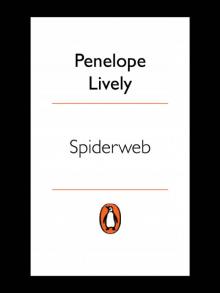 Spiderweb
Spiderweb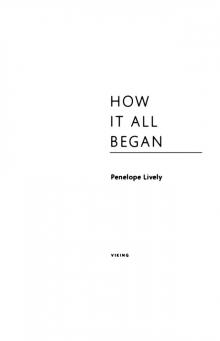 How It All Began
How It All Began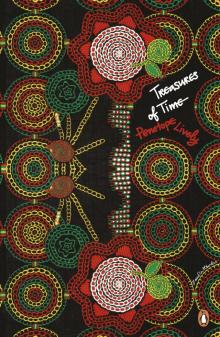 Treasures of Time
Treasures of Time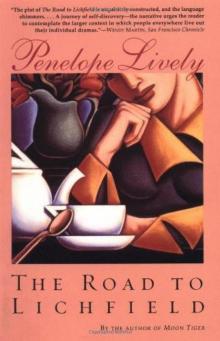 The Road to Lichfield
The Road to Lichfield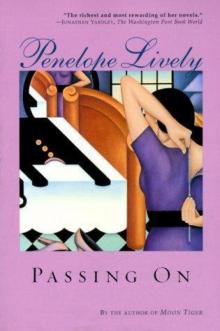 Passing On
Passing On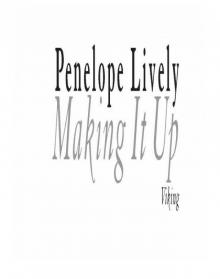 Making It Up
Making It Up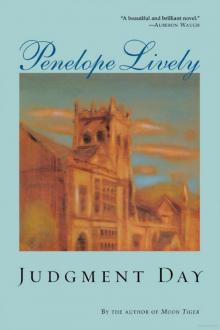 Judgment Day
Judgment Day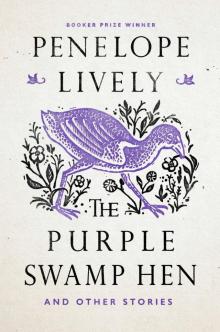 The Purple Swamp Hen and Other Stories
The Purple Swamp Hen and Other Stories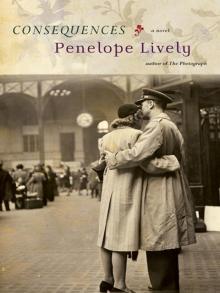 Consequences
Consequences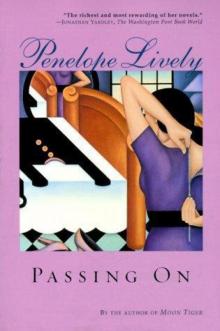 *****Passing On*****
*****Passing On*****